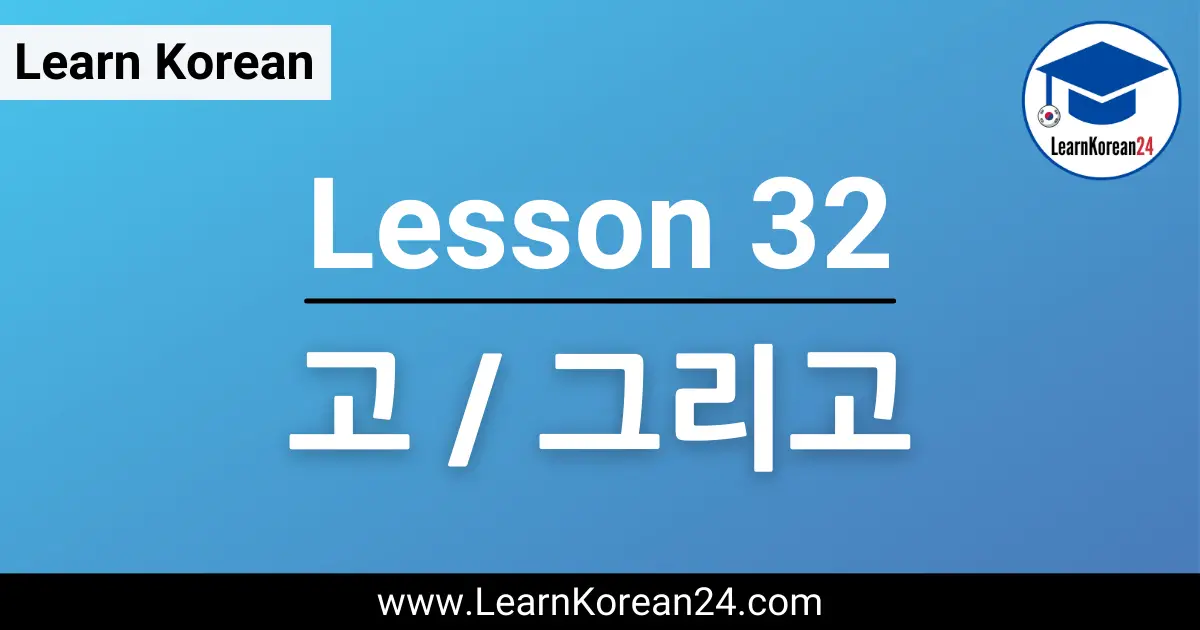Lesson 32: 고 / 그리고
In this lesson, you will learn about 그리고 and 고. In lesson 11 you learned how to use 하고 to say ‘and‘ or ‘with’. 그리고 and 고 also mean ‘and’ in Korean, but they also can be used to express ‘and then‘. By the end of this lesson, you’ll be able to say things like “I like Korean dramas. And I like Korean movies, too.”, “I eat dinner and then go for a walk every day.“, etc.
Lesson 32: 고 / 그리고
그리고 Meaning
그리고 means ‘and‘ or ‘and then‘ in Korean. 그리고 can be used to connect nouns or to connect sentences. By linking together nouns in a sentence with 그리고, you are showing that those nouns form a list. When linking together two sentences with 그리고, you are indicating that those sentences form a list or are in sequential order. Let’s look at an example.
그리고 To Link Nouns
우유 그리고 주스 = milk and juice
우유 그리고 주스를 샀어요. = I bought milk and juice.
그리고 To Link Sentences
수민 씨는 똑똑해요. = Sumin is smart.
수민 씨는 예뻐요. = Sumin is pretty.
수민 씨는 똑똑해요. 그리고 예뻐요. = Sumin is smart. And she’s pretty.
As you can see in this example 그리고 is used to connect two sentences together and has the meaning of ‘and‘. 그리고 can also be used to connect two sentences with the meaning of ‘and then‘. Let’s look at an example.
친구를 만났어요. = I met a friend.
영화를 봤어요. = (I/we) watched a movie
친구를 만났어요. 그리고 같이 영화를 봤어요. = I met a friend. And then we watched a movie together.
Difference Between 그리고 and 고
Like 그리고, 고 also can mean ‘and’ or ‘and then’. The difference between 그리고 and 고 is that while 그리고 is used to link sentences, 고 is used to connect two clauses in the same sentence. Let’s look some examples.
Clause 1: 이 치마는 싸요. = This skirt is cheap.
Clause 2: 이 치마는 예뻐요. = This skirt is pretty.
Together: 이 치마는 싸고 예뻐요. = This skirt is cheap and pretty.
Clause 1: 아침을 먹었어요. = I ate breakfast.
Clause 2: 운동을 했어요. = I exercised.
Together: 아침을 먹고 운동을 했어요. = I ate breakfast and then exercised.
*When linking together two clauses with 고, usually only the final clause in the sentence is marked with the tense, especially when both clauses have the same tense (e.g “아침을 먹고 운동을 했어요.” sounds more natural than “아침을 먹었고 운동을 했어요.”)
Example Sentences
한국 드라마를 좋아해요? = Do you like Korean dramas?
네, 한국 드라마를 좋아해요. 그리고 한국 영화도 좋아해요. = Yes, I like Korean dramas. And I like Korean movies, too.
부산 사람이에요? = Are you a Busan native?
네, 저는 부산에서 태어났어요. 그리고 지금 부산에 살아요. = Yes, I was born in Busan. And I live in Busan now.
오늘 날씨가 어때요? = How is the weather today?
오늘은 날씨가 춥고 흐려요. = It’s cold and cloudy today.
저녁에 보통 뭐 해요? = What do you usually do in the evening?
저는 매일 저녁을 먹고 산책해요. = I eat dinner and then go for a walk every day.

